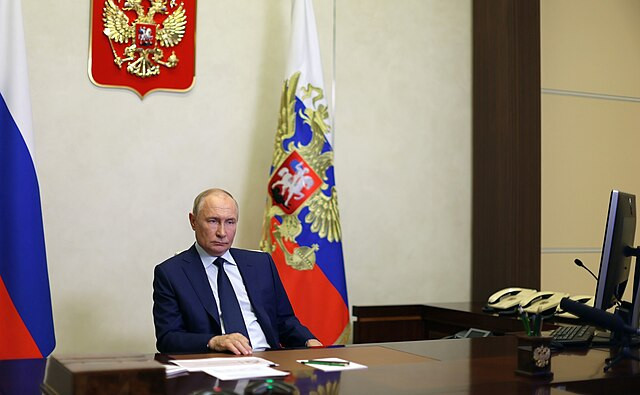As tensions between Russia and Ukraine escalate, Moscow has issued a stark warning, threatening to reduce Kyiv to a "giant melted spot" if Western allies permit Ukraine to use long-range missiles to strike targets deep within Russian territory. This alarming declaration by Dmitry Medvedev, the deputy chairman of Russia's Security Council and former president, underscores the growing volatility in the region as the West debates expanding Ukraine's military capabilities.
Medvedev, who is known for his aggressive rhetoric, suggested that Russia could use advanced conventional weapons rather than nuclear arms to carry out a devastating attack on the Ukrainian capital. In a Telegram post, Medvedev expressed frustration with what he described as the West's testing of Russia's patience, stating, "The pompous Anglo-Saxon imbeciles do not want to admit one thing: any patience comes to an end."
Medvedev's threats come as the U.S. and U.K. consider allowing Ukraine to use British-made Storm Shadow cruise missiles for strikes within Russia. These missiles, with a range of up to 155 miles, could enable Ukraine to target strategic Russian military assets far beyond the current frontlines. Ukrainian President Volodymyr Zelenskyy has been pressing Western leaders for permission to use these long-range weapons, arguing that they are crucial for Ukraine's defense and counteroffensive efforts.
Zelenskyy reiterated his plea during a speech on Friday, stating, "We are making progress on the battlefield. But we need permission to use long-range weapons. I hope that the U.S. political community understands this clearly and that the relevant decision will be made." The issue was a key topic of discussion during a meeting between U.K. Prime Minister Keir Starmer and U.S. President Joe Biden in Washington on Friday, although no final decision was announced.
While Medvedev hinted at the possibility of using a massive conventional weapon, such as Russia's "Father of All Bombs" (FOAB), his comments also left the door open to nuclear escalation. He noted that Russia already has "formal" grounds to use nuclear weapons following Ukraine's recent cross-border incursion into Russia's Kursk region. However, Medvedev added that "a nuclear conflict is really not needed by anyone," acknowledging the grave consequences of such an action.
The FOAB, officially known as the Aviation Thermobaric Bomb of Increased Power, is the most powerful conventional bomb in Russia's arsenal. It weighs over 7,100 kilograms and has an explosive yield equivalent to 44 tons of TNT. The bomb creates a massive blast wave and intense heat, making it highly effective against both fortified and soft targets. Medvedev's reference to "new delivery vehicles" suggests that Russia could consider using advanced missile systems, such as the RS-28 Sarmat, to deliver the FOAB or similar weapons.
The Sarmat missile, also known as Satan II, is a liquid-fueled intercontinental ballistic missile (ICBM) capable of carrying multiple warheads, including conventional ones. While it was primarily designed to deliver nuclear payloads, the Sarmat's payload capacity makes it a potential platform for deploying large conventional bombs like the FOAB. The missile was officially inducted into Russia's strategic forces in September 2023, marking a significant advancement in Russia's military capabilities.
Medvedev's ominous warning underscores the high stakes involved in the ongoing conflict between Russia and Ukraine. As the West deliberates on whether to grant Ukraine expanded military capabilities, the potential for further escalation looms large. Russian President Vladimir Putin has made it clear that any Western decision to allow Ukraine to use long-range missiles against Russian territory would be viewed as an act of war, significantly altering the nature of the conflict.
In response to these developments, Russian officials have emphasized the need for a proportionate response to any Ukrainian escalation. While the use of a massive conventional bomb would undoubtedly cause significant destruction, it would not carry the same global ramifications as a nuclear strike. Nevertheless, the threat of such an attack adds another layer of complexity to an already fraught situation.




